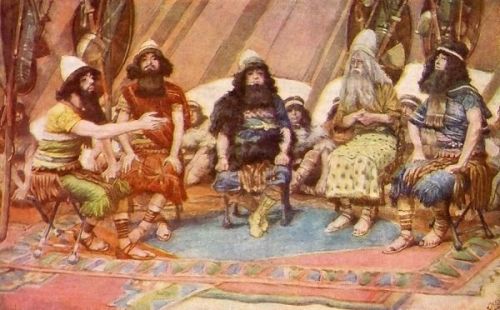The
Last Five Kings of Judah
Stephen
Terry
Commentary
for the October 17, 2015 Sabbath School Lesson
 “He
defended the cause of the poor and needy, and so all went well. Is that not
what it means to know me?” Jeremiah 22:16, NIV
“He
defended the cause of the poor and needy, and so all went well. Is that not
what it means to know me?” Jeremiah 22:16, NIV
The last five kings of Judah were contemporary with the prophet
Jeremiah. The Northern Kingdom had previously fallen to the Assyrians, who were
in turn conquered by the Babylonians. This left a short period where there was
a power vacuum in Palestine. The five kings, Josiah, Jehoahaz, Jehoiakim,
Jehoiachin, and Zedekiah, tried in various ways to deal with the shifting tides
of power that swept through the area. The previous five hundred years had seen
a transition from weapons and implements based on bronze to a powerful Iron Age
that allowed those able to take advantage of the new technologies in creative
ways the ability to dominate other, less advanced societies. Judging from their
steady decline, the Jews of that era were perhaps not as adept at those technologies
as their neighbors. In spite of that possibility, the two previous kings,
Manasseh and Amon tried to pull off being the baddest actors in the area during
their tenures.
Ignoring their examples, Josiah chose a different route
when he became king. Perhaps it was his youth (he became king at age 8) that
allowed righteous counselors to influence him, or, as some might advocate, he
was a very specially endowed individual with spiritual insights beyond his
years. In any event, while he did not begin for several years, he ultimately made
a concerted effort to rid first the countryside and then Jerusalem itself from
the heresies brought into the national religious practice through the
influences of the idol-worshiping nations around them.
These inroads had been made all the more prevalent by
the accommodating practices of his predecessors. Manasseh in particular had
been extremely zealous to wipe out Jewish faith and practice. He rebuilt the
heathen altars that his father Hezekiah had torn down and even went so far as
to sacrifice one of his sons in the flames to one of those heinous heathen
cults.[i] His son, Amon, continued
in his father’s steps when he came to the throne.[ii]
Oddly, Manasseh went to his grave in peace, while his
son was assassinated. Those who would attribute justice to God might think that
Manasseh should have met a similar fate. However, according to the account in 2
Chronicles, Manasseh undergoes a rehabilitation that is not mentioned in 2
Kings. Apparently he is taken prisoner to Babylon where he repents of his evil
past and asks God’s intervention. Eventually, he is allowed to return to
Jerusalem, a changed man, per the chronicler.[iii]
If this change actually took place and was not simply a
later writer’s attempt to rationalize the discrepancy over Manasseh’s fate as
opposed to his son’s when they were both extremely evil, the repentance did not
seem to make a difference to Amon, who must have witnessed it. That this
tendency to favorably edit perhaps existed with the writer of Chronicles can be
seen in other places. For instance, the writer of 2 Samuel tells us that God
caused David to do a census of Israel.[iv] Uncomfortable with that
representation of God’s character, the writer of Chronicles appears to have edited
the account to say that Satan, rather than God, was the one who caused David to
do the census.[v]
Regardless of where one might stand concerning such comparative analysis, Amon
appears to have learned only evil from his father’s example, while Josiah, perhaps
unexpectedly, went in a completely opposite direction.
What adds to the strangeness of Josiah’s break with the practice
of his forebears is that even the holy texts were apparently lost and not
rediscovered until after his reforms had already begun.[vi] One might be tempted to attribute
this change in behavior then to Jeremiah’s influence, but the word of the Lord
came to Jeremiah in the thirteenth year of Josiah’s reign.[vii] The reforms began in the
twelfth year.[viii]
We are also told by this source that he began to seek the Lord four years
before that. Perhaps he was influenced by Jeremiah’s father Hilkiah, who seems
to have been the high priest. An ongoing relationship might also explain why
Hilkiah is later closely working with the king on the restoration of the
temple. Of course this may simply be due to any high priest and king normally
working together. But the relationship certainly appears to be less hostile
than under the previous kings. However, once Josiah was gone, things quickly
changed. I cannot help but wonder what may have become of Hilkiah. Although the
Bible does not tell us how his time as high priest ended, he was apparently succeeded
by his son Azariah. Considering the opposition from the subsequent rulers, it
is remarkable that the office of high priest even continued until the
captivity.[ix]
Unfortunately, in spite of his righteousness, Josiah was
not prevented from making bad judgment calls. When Pharaoh Necho marched
out to aid the remnant of the Assyrian army against the Babylonians who were
taking over the Assyrian empire, he chose to oppose them. Even though Pharaoh
had no quarrel with Jerusalem, Josiah persisted and was slain. This delay may
have cost the Egyptians the victory at the subsequent battle of Carchemish. The
result of the battle was a sound defeat for the combined Egyptian/Assyrian
military alliance and marked the end of the Assyrian Empire. Pharaoh did not
venture out of Egypt to challenge Babylon again either.
Josiah was not alone in making bad judgments. The remaining
kings seem to have tried to play off Egypt and Babylon against one another in a
futile effort to maintain a delicate balance with Jerusalem somehow surviving
on the knife-edge border between the two enemies. After Josiah’s death, the
people of Jerusalem chose Jehoahaz to be king, but Necho would have none of it
and deposed him on his way back to Egypt, leaving his more Egyptophile brother,
Jehoiakim, on the throne. He then took Jehoahaz as prisoner to Egypt. Remarkably,
Jehoiakim was able to appease both powers enough to remain on the throne for
twelve years. It was during Jehoiakim’s reign that Daniel, Shadrach, Meshach,
and Abednego were taken to Babylon and enrolled to learn the Babylonian
language and their customs.[x] Their treatment suggests
that rather than captives who were bound for slavery, they were scions of
Jewish noble houses chosen to be hostages to ensure compliance with Babylonian
requirements.
Jehoiakim, placed on the throne by Pharaoh, had
apparently been perceived as being too friendly to Egypt and Nebuchadnezzar
besieged Jerusalem while on a foray to attack Egypt. That attack failed to
overcome Egyptian resistance and may have emboldened Jehoiakim. In any event,
Jehoiakim, himself was taken to Babylon as prisoner, much as Manasseh had been
by the Assyrians.
Finding that Jehoiachin was then made king, Nebuchadnezzar
then sent to arrest him and deport him to Babylon, while placing his uncle
Zedekiah on the throne. Nonetheless, Zedekiah also rebelled against the
Babylonians and met a worse fate than his predecessors. His sons were slain
before him. Then he was blinded, bound and hauled off to Babylon. By then,
Nebuchadnezzar had become so fed up with the constant rebellion from the Jews
that he burned Jerusalem to the ground.[xi]
While it is pure conjecture as there are no records
stating such, when Nebuchadnezzar constructed his immense statue on the Plain
of Dura, Zedekiah, as an important provincial ruler, may have been required to
attend. Witnessing the bold response to the command to worship the statue by
the three Hebrews previously taken to Babylon and their miraculous deliverance,[xii] he may have felt
emboldened to resist Nebuchadnezzar when he returned to Jerusalem.
It is interesting that Nebuchadnezzar may have been
making every effort not to damage the relationship between Babylon and
Jerusalem. When the three Hebrews refused to bow before the image, he
uncharacteristically allowed them a second chance. This may have in part
accounted for his rage, since more was at stake than simple obedience to a
command. Nonetheless, they demurred, punishment began and they were miraculously
delivered. If in attendance, Zedekiah could not have failed to consider the
implications of all of this. The few months[xiii] it took to travel back
to Jerusalem with his advisors may have provided ample opportunity to discuss
what had happened and spawn the rebellion that ended so tragically.
It is onto this geo-political stage that God thrusts the
prophet Jeremiah. While the Bible presents us with a stalwart Jeremiah
confronting rebellious, selfish, and greedy kings as his foils, the plot is not
as black and white as it may appear. Things were every bit as complicated in
his day as ours. Those who pretended to listen to the prophet one day may be
just as eager to dismiss him, or even end his life if it suited their
aspirations later. It is in such a morass of conflicting values and political
maneuvering that each of us must bear testimony to our faith. Perhaps we can be
as faithful in our determination as Jeremiah, son of Hilkiah.
